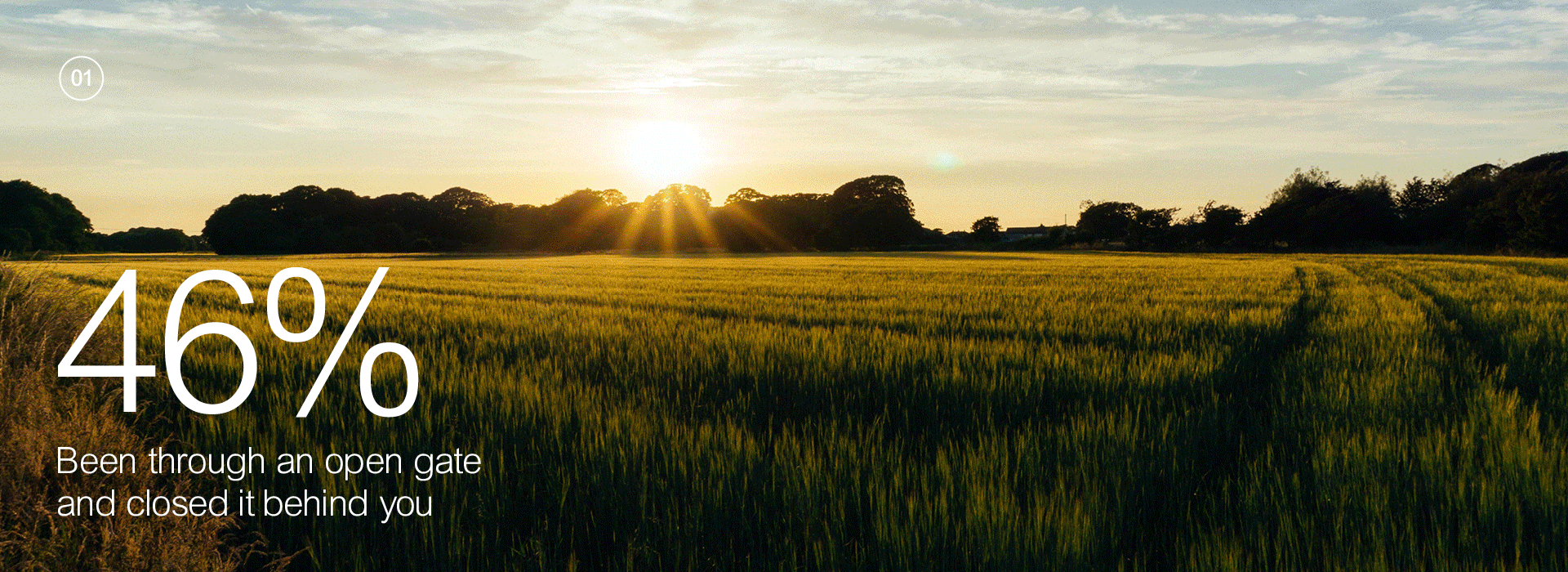28th Mar 2022
The UK Walking Report 2022
Exploring the nation’s walking habits and awareness of the Countryside Code.
28th Mar 2022
Exploring the nation’s walking habits and awareness of the Countryside Code.
The England and Wales Walking Report 2022
Inspiring the next 50 years of adventure
As part of our 50th anniversary celebrations, we are looking ahead to the next half century of adventure in the UK, and how people can help to care for our precious landscapes. Rohan has a long history of inspiring adventure, and is now looking to educate a new generation of explorers to be able to protect the very spaces we all know and love.
The pandemic has dramatically shifted the way that many people view and enjoy the countryside, with visits to our incredible green spaces drastically increasing since lockdown.
Whilst it is fantastic that so many people are discovering the beauty of the UK, it has never been more important that we all play our part to protect our natural environments, so they can continue to be appreciated by future generations.
Our project began by surveying over 1,800 adults about their walking habits and awareness of the Countryside Code – one of the main initiatives designed to help preserve our wild spaces.
The situation
61% - Visits to UK national parks rose by 5.2m (61%) between 2016 and 2019, with some parks reporting increases of over 250% (VisitBritain – latest data)
78% - People spent 78% more time in parks when lockdown lifted than they did pre-pandemic, with some local authorities seeing rises of over 400% (Google Mobility)
35% - More than a third of adults say that lockdown has made them visit green and natural spaces more often (Natural England)

Breaking the Code
Our survey found that seven in ten (70%) adults in England and Wales break the Countryside Code when they go out walking.
The most common way people go against the rules is by walking through an open gate and then not closing it behind them (46%).
This is followed by people climbing over fences, walls or hedges away from the main footpath (23%).
5% of walkers also admit to leaving litter while out in the countryside, however, more positively, almost a third (31%) of respondents said that they have previously picked up someone else’s waste.
Who is going against the Code?
Young adults are more likely to admit to one of the behaviours that go against the Countryside Code. Almost three quarters (73%) of 25-34-year-olds have breached at least one rule while out walking, and the generation below (18-24s) are similar (72%).
Regarding gender, both men and women share the same top five discouraged actions, but male walkers are more likely to admit to them. For example, over a quarter (27%) of men say they have climbed over a fence, wall or hedge away from the main path, compared to just one in five (20%) women.
Where people live is also a factor. People from urban environments are more likely to drop litter (6% vs 3%) and leave open previously-closed gates (6% vs 3%) than those who live rurally.
Why does it matter?
We’ve partnered with Sam Durham, Chief Land Management Adviser at the National Farmers’ Union of England and Wales (NFU) to explain why these breaches of the Countryside Code are significant.

Sam Durham is Chief Land Management Adviser at the NFU. He’s been at the NFU for nearly eight years, and previously worked for environmental charities, (including WWF) as well as managing Flat Holm Island nature reserve off the Welsh coast. At the NFU, he leads its national policy work on access to the countryside, which involves liaising with the government to make sure legislation and guidance doesn’t impact productive farming and visitors can have a great experience and stay safe.

1) Closing an open gate
“Generally, a gate is closed or open for a reason, and it has been left that way by the farmer. It may be left open to give livestock access to food and water, or because they are working in the field and require regular access.”
2) Climbing over a fence, wall or hedge away from the footpath
“Field boundaries such as these aren’t designed to be climbed over and you will likely cause damage if you do. Fences are often topped with barbed wire and hedges include prickly species such as hawthorn, so you may also hurt yourself if you climb.
“Drystone walls are iconic parts of many landscapes, and it is a skill to build these without using mortar. It can be easy to dislodge a stone if you climb over the wall, and this can lead to the whole wall collapsing.”
3) Taking a rock, stone or plant home
“It is always good practice to leave nothing but footprints, so everything will be there for the next visitor to enjoy. Practically, rocks could be part of historic ruins, stones could protect insect habitats and flowers could be important for insect pollinators.”
Do people know they are breaking the Code?
We found that the vast majority of people are going against the Countryside Code unknowingly. Just one in eight (12%) adults say they know exactly what is included in the Code, and almost half (48%) have no knowledge at all, or aren’t sure.
Unsurprisingly, people who walk frequently are far more aware of the Code than those who don’t. Walkers who visit the countryside every day are five times more likely to have some knowledge of the regulations than those who never do (77% vs 16%).
What can be done to protect the countryside?
Education will be key to helping people enjoy the outdoors responsibly, and efforts should be made to increase awareness of the Countryside Code and the significance of breaking its guidelines.
As Sam Durham explains: “The Countryside Code is a vital way of helping visitors understand how to enjoy the countryside responsibly, allowing them to have a great time while visiting the countryside without causing unintended disturbance or damage.
“To spread the word, there needs to be a lot more coverage in the media and on social media, so everyone who visits the countryside knows how to be safe and respect the environment.”
You can also do your bit as an individual.
When you are out walking:
- Be considerate to those living in, working in and enjoying the countryside
- Leave gates and property as you find them
- Use gates, stiles or gaps in field boundaries where you can
- Take your litter home - leave no trace of your visit
- Do not light fires and only have BBQs where signs say you can
- Always keep dogs under control and in sight
- Bag and bin dog poo
- Leave rocks, stone, plants and trees as you find them
- Follow local signs and keep to marked paths unless wider access is available
- Do not interfere with farm machinery, horses or livestock
- Give wild animals, livestock and horses plenty of space and do not feed them
You can also support some of the many charities that do amazing work to protect our countryside.
Fix the Fells – protect Lakeland fells from erosion by repairing and maintaining upland paths
Mend our Mountains – a BMC campaign to repair footpaths in the UK’s national parks
National Trust – promote and preserve places of natural beauty and historic interest
Keep Britain Tidy – improve the environment by eliminating litter and ending waste
Clean Up Britain – find sustainable and effective solution to Britain’s litter and fly-tipping problem
Keep Wales Tidy – work across Wales to protect the environment
The Countryside Charity – aim to make the countryside and green spaces available to all and rich in nature
Do you know the signs and symbols of the countryside?
We’ve created a quiz containing a variety of signs and symbols that you might see while out walking in the countryside. They all refer to rights of way for different user groups.
On average, people only get two out of the six questions correct and just 18% of our survey respondents scored more than half.
One in seven (14%) didn’t get a single question right.
Walking wishlist
As part of our research, we also asked people if they had ever been out on a walk and wished they’d packed additional clothing or equipment.
Almost nine in ten (87%) adults said that they had regretted leaving something behind, with waterproofs (39%) and warm coats (38%) being the most commonly forgotten items.

If you’re heading out into the countryside, you can get all the clothes and equipment you need at Rohan.